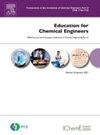影响化学工程专业物理化学专业学生学习成绩的因素
IF 2.3
2区 教育学
Q1 EDUCATION, SCIENTIFIC DISCIPLINES
引用次数: 0
摘要
物理化学的学业成功受到个人、制度和社会因素的影响。关键的预测因素包括以前的学习成绩、学习习惯、动机和时间管理。坚实的基础知识、有效的学习策略和自我效能感是克服挑战的关键。制度因素,特别是教学质量、学术政策和资源可及性,对结果有显著影响,其中结构化教学法比互动式学习环境更有影响力。同伴互动,包括团队凝聚力和教师参与,成为成功的最强社会预测因素。成绩期望明确、自我效能感强的学生表现出更高的坚持和成就,而压力、身体健康和行政支持对整体幸福感有间接影响。回归分析证实了这些因素的预测强度。学生的反馈强调需要额外的实践问题、辅导和在线资源,而教师则强调概念理解、数学技能和工作量管理方面的挑战。通过基于证据的教学、灵活的评估和有针对性的干预来解决这些问题,可以提高学生的表现。大学应该整合个性化学习、动机驱动策略和制度支持,以培养韧性和长期的学术成功。摘要物理化学的学术成功是由先前的成就、学习习惯、动机和同伴互动决定的。结构化教学法、自我效能感和制度支持驱动绩效。本文章由计算机程序翻译,如有差异,请以英文原文为准。
Factors influencing the academic performance of chemical engineering students in physical chemistry
Academic success in Physical Chemistry is influenced by personal, institutional, and social factors. Key predictors include prior academic performance, study habits, motivation, and time management. A strong foundation in prerequisite knowledge, effective learning strategies, and self-efficacy are crucial for overcoming challenges. Institutional factors, particularly instructional quality, academic policies, and resource accessibility, significantly impact outcomes, with structured pedagogy proving more influential than interactive learning environments. Peer interactions, including group cohesion and instructor engagement, emerged as the strongest social predictors of success. Students with clear grade expectations and strong self-efficacy exhibited higher persistence and achievement, while stress, physical health, and administrative support played indirect roles in overall well-being. Regression analysis confirmed the predictive strength of these factors. Student feedback highlighted the need for additional practice problems, tutoring, and online resources, while faculty emphasized challenges in conceptual understanding, mathematical skills, and workload management. Addressing these concerns through evidence-based teaching, flexible assessments, and targeted interventions can enhance student performance. Universities should integrate personalized learning, motivation-driven strategies, and institutional support to foster resilience and long-term academic success.
Tweetable Abstract
Academic success in Physical Chemistry is shaped by prior achievement, study habits, motivation, and peer interactions. Structured pedagogy, self-efficacy, and institutional support drive performance.
求助全文
通过发布文献求助,成功后即可免费获取论文全文。
去求助
来源期刊

Education for Chemical Engineers
Multiple-
CiteScore
8.80
自引率
17.90%
发文量
30
审稿时长
31 days
期刊介绍:
Education for Chemical Engineers was launched in 2006 with a remit to publisheducation research papers, resource reviews and teaching and learning notes. ECE is targeted at chemical engineering academics and educators, discussing the ongoingchanges and development in chemical engineering education. This international title publishes papers from around the world, creating a global network of chemical engineering academics. Papers demonstrating how educational research results can be applied to chemical engineering education are particularly welcome, as are the accounts of research work that brings new perspectives to established principles, highlighting unsolved problems or indicating direction for future research relevant to chemical engineering education. Core topic areas: -Assessment- Accreditation- Curriculum development and transformation- Design- Diversity- Distance education-- E-learning Entrepreneurship programs- Industry-academic linkages- Benchmarking- Lifelong learning- Multidisciplinary programs- Outreach from kindergarten to high school programs- Student recruitment and retention and transition programs- New technology- Problem-based learning- Social responsibility and professionalism- Teamwork- Web-based learning
 求助内容:
求助内容: 应助结果提醒方式:
应助结果提醒方式:


